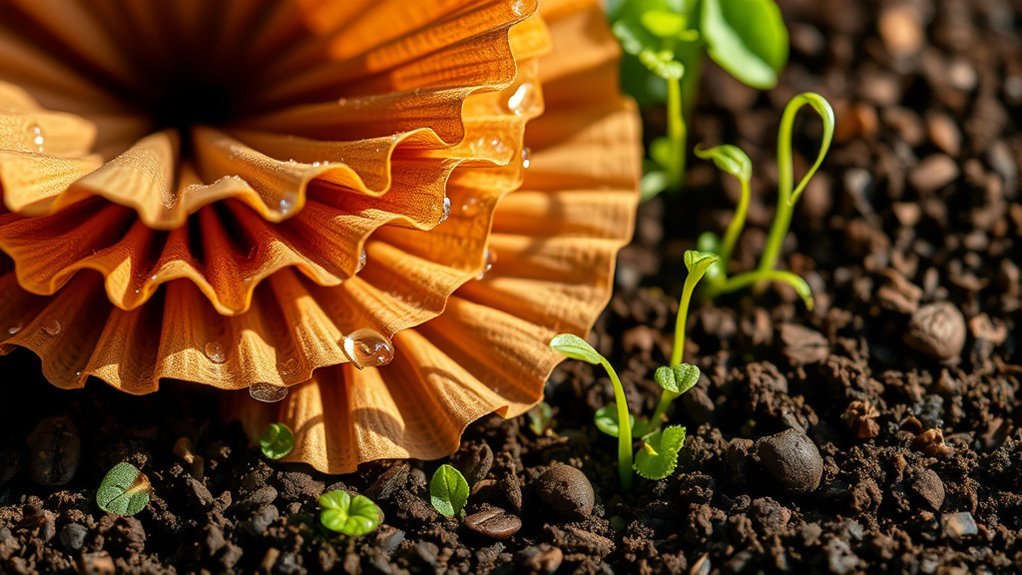Can I Compost Coffee Filters
Yes, you can compost coffee filters since they’re made from biodegradable paper, adding valuable carbon material to your compost. For best results, choose unbleached filters and pair them with green materials like fruit scraps for a balanced mix. Be sure to maintain moisture and aeration in your compost pile for ideal breakdown. Remember, not all filters are the same, and knowing what to avoid is essential. There’s more to uncover about maximizing your composting efforts.
Understanding Coffee Filters and Their Materials
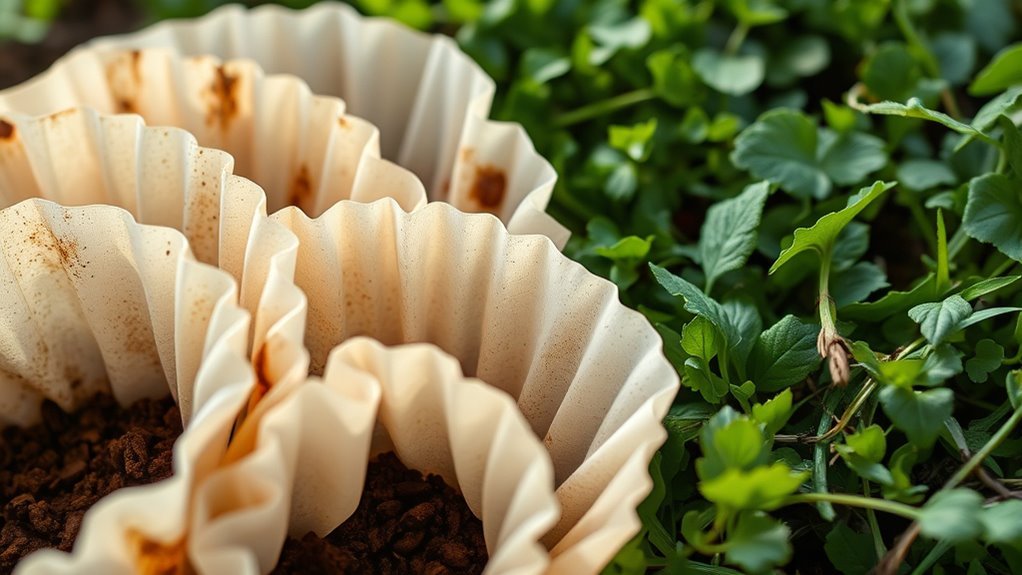
When it comes to brewing your morning cup of coffee, the filter plays an essential role in the process. Understanding the various filter materials is important for any coffee enthusiast who values both flavor and environmental impact. Traditional paper filters are often bleached or unbleached, affecting their eco-friendliness. If you’re looking for compostable options, consider filters made from natural fibers like hemp or bamboo. These materials break down more easily in compost, aligning with a sustainable lifestyle. Additionally, metal filters offer a reusable alternative, reducing waste. By choosing the right filter, you not only enhance your coffee experience but also contribute to a healthier planet. Weigh your options carefully to enjoy your brew guilt-free while embracing your freedom to choose.
The Benefits of Composting Coffee Filters
Composting coffee filters offers a simple way to reduce waste while enriching your garden soil. When you add filters to your compost, you’re not only diverting materials from landfills but also contributing organic matter that enhances soil health. This process ultimately leads to nutrient-rich soil, benefiting your plants and the environment.
Eco-Friendly Waste Reduction
While many people enjoy their daily cup of coffee, they might not realize that the coffee filters used in brewing can be a valuable addition to your compost pile. By composting these filters, you’re engaging in sustainable practices that greatly contribute to eco-friendly waste reduction. Coffee filters are typically made from paper, which breaks down easily and enriches your compost. This simple act helps divert organic waste from landfills, improving your waste management efforts. Furthermore, it reduces the overall environmental impact of disposable products. By incorporating coffee filters into your compost, you’re not only reducing waste but also promoting a healthier ecosystem. Embracing such practices empowers you to make a positive difference, fostering a more sustainable future for us all.
Nutrient-Rich Soil Additive
Since coffee filters are primarily made of paper, they can greatly enhance your compost by contributing valuable carbon material. This addition helps balance the nitrogen typically found in kitchen scraps, promoting a healthier composting process. By composting coffee filters, you’re not only reducing waste but also creating a nutrient-rich soil additive that boosts soil fertility. The cellulose in the filters aids in nutrient retention, ensuring that essential elements are available to your plants over time. As the filters decompose, they improve soil structure, enhancing aeration and water retention. Ultimately, incorporating coffee filters into your compost pile can lead to a thriving garden, empowering you to cultivate healthier plants while embracing sustainable practices.
How Coffee Filters Break Down in Compost
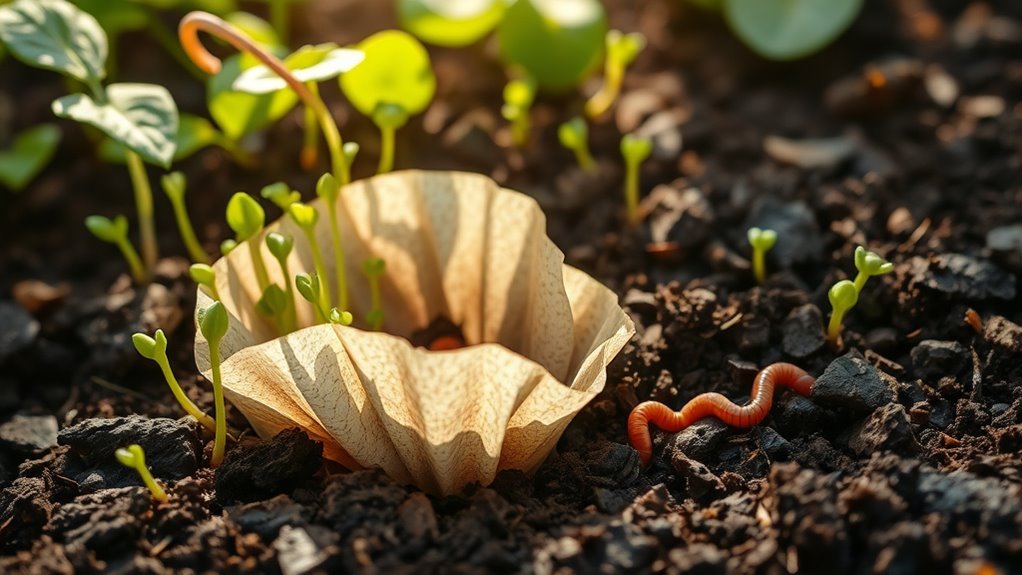
Although many people might overlook them, coffee filters are a valuable addition to your compost pile. Their paper composition allows for efficient coffee filter decomposition, as they break down over time through compost microbial activity. The microorganisms in your compost are essential, as they help decompose organic matter, including coffee filters, into nutrient-rich soil.
| Stage of Decomposition | Timeframe |
|---|---|
| Initial Breakdown | 2-4 weeks |
| Mid-Stage | 1-3 months |
| Final Decomposition | 3-6 months |
Understanding these stages can help you gauge when your compost is ready. By including coffee filters, you’re not only reducing waste but enriching your compost with valuable carbon, contributing to a healthier ecosystem.
Tips for Composting Coffee Filters Effectively
To maximize the benefits of composting coffee filters, it’s important to follow a few effective tips. First, consider the coffee filter types you’re using; unbleached filters are preferable, as they break down more easily. When adding them to your compost, pair them with green materials like fruit scraps or vegetable peels to balance carbon and nitrogen levels. Use composting techniques such as shredding the filters to enhance decomposition speed. Additionally, make certain your compost pile maintains proper moisture and aeration, which promotes microbial activity. Finally, regularly mix your compost to prevent clumping and encourage an even breakdown of materials. By following these tips, you’ll effectively integrate coffee filters into your composting routine, contributing to a healthier compost pile.
What to Avoid When Composting Coffee Filters
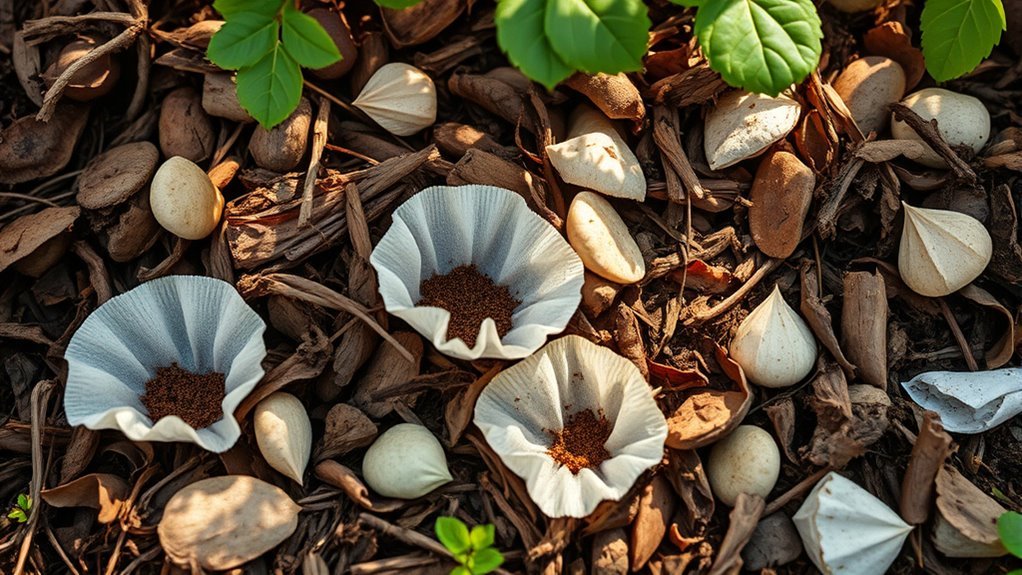
When composting coffee filters, you should be aware of certain practices that can hinder the composting process. Here’s what to avoid:
| What to Avoid | Reason | Alternatives |
|---|---|---|
| Filters with bleach | Harmful additives can disrupt | Unbleached filters |
| Non-biodegradable types | They won’t break down | 100% compostable filters |
| Excessive oils | Can attract pests | Rinse before composting |
| Plastic-lined filters | Contain non-compostable materials | Use natural fiber filters |
| Contaminated filters | May introduce pathogens | Guarantee cleanliness |
Combining Coffee Filters With Other Compost Materials
When composting coffee filters, it’s crucial to take into account the balance between brown and green materials. Brown materials, like the filters themselves, provide carbon, while green materials offer nitrogen. By effectively layering these components, you can enhance the composting process and improve the overall quality of your compost.
Brown vs. Green Materials
While coffee filters are often considered a brown material due to their carbon content, understanding how they fit into the broader context of composting requires a closer look at the balance between brown and green materials. Brown materials, like coffee filters, provide essential carbon, while green materials—such as fruit scraps and grass clippings—offer nitrogen. For ideal composting, you should aim for a ratio of about three parts brown to one part green. This balance not only helps maintain the right moisture level but also accelerates decomposition. So, when composting coffee filters, think about what green materials you can add to create a harmonious mix. This approach will enhance your compost’s effectiveness and contribute to a thriving ecosystem.
Layering Techniques for Compost
Although many gardeners recognize the value of coffee filters in composting, effectively layering them with other materials can greatly enhance the decomposition process. Using strategic layering methods can improve airflow and moisture retention. Here’s a simple table to help you visualize effective composting strategies:
| Layer Type | Example Materials |
|---|---|
| Brown Materials | Coffee filters, dry leaves |
| Green Materials | Fruit scraps, vegetable peels |
| Nitrogen-Rich | Grass clippings, manure |
| Carbon-Rich | Cardboard, shredded paper |
| Aeration Layer | Twigs, straw |
Using Compost Made From Coffee Filters in Your Garden
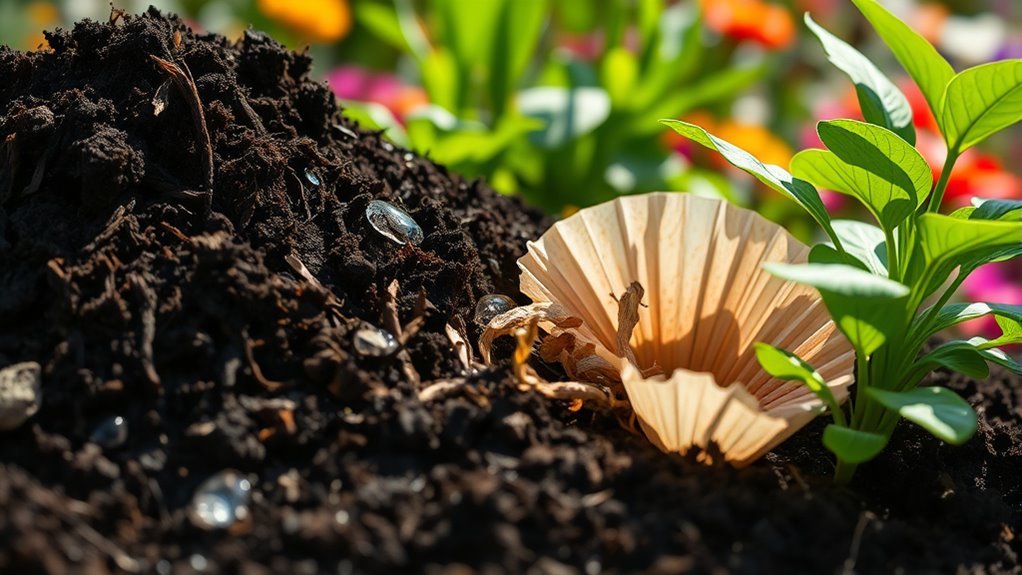
Using compost made from coffee filters can greatly enrich your garden’s soil, as these filters are typically made from biodegradable materials like paper. When you add this compost to your garden, you’re not just recycling waste; you’re actively contributing to soil improvement. The organic matter in coffee filters breaks down and enhances nutrient content, which supports garden health. Additionally, they help retain moisture, making it easier for plants to thrive. As you incorporate this compost, you create a more balanced ecosystem, benefitting all the plants in your garden. By embracing this simple practice, you empower your garden to flourish naturally, allowing you to enjoy the fruits of your labor while contributing to a sustainable environment.
Alternatives to Composting Coffee Filters
What if composting coffee filters isn’t the best option for your gardening needs? You might consider several recycling options instead. Many municipalities have recycling programs that accept paper products, including coffee filters. This allows you to reduce waste without sacrificing environmental integrity. If you’re looking for biodegradable alternatives, try switching to unbleached coffee filters or even reusable cloth filters. These options break down easily and can enhance your sustainability efforts. You could also explore using coffee grounds directly in your garden, as they provide valuable nutrients. By reassessing how you handle coffee filters, you can find methods that align with your commitment to eco-friendly practices while still enjoying your daily brew.
Frequently Asked Questions
Can I Compost Colored or Printed Coffee Filters?
When considering if you can compost colored or printed coffee filters, it’s essential to know what materials were used in the dyes and designs. If they’re made from natural, non-toxic materials, you’re likely safe to compost them. However, filters with synthetic dyes or coatings can release harmful chemicals. Always check for any certifications or labels that indicate they’re compostable. Ultimately, it’s about ensuring you’re contributing to a healthy compost ecosystem.
Do Paper Coffee Filters Attract Pests in Compost?
When considering whether paper coffee filters attract pests in compost, it’s essential to focus on pest prevention strategies. Generally, coffee filters don’t draw pests when used correctly. They break down and contribute to compost benefits, improving soil health. To minimize any risk, balance your compost with green and brown materials, ensuring proper aeration and moisture. By maintaining a well-managed compost pile, you can enjoy the freedom of composting without pest concerns.
How Many Coffee Filters Can I Compost at Once?
When considering how many coffee filters you can compost at once, it depends on your composting capacity and the types of filters you’re using. Generally, if you’re using unbleached paper filters, you can add several at a time, as they break down easily. However, if they’re bleached, it’s best to limit the amount to avoid introducing harmful chemicals. Balance is key, so monitor your compost’s moisture and aeration for ideal results.
Are Biodegradable Coffee Filters Better for Composting?
Biodegradable coffee filters are generally better for composting than traditional ones. Since they’re made from biodegradable materials, they break down more efficiently, enriching your compost with organic matter. This enhances the composting benefits, like improving soil structure and fertility. When you choose biodegradable filters, you’re not just reducing waste; you’re also contributing to a healthier ecosystem. Ultimately, opting for these filters aligns with a sustainable lifestyle that promotes environmental freedom and responsibility.
Can I Use Used Coffee Filters From Tea Bags?
You can definitely use used tea filters in your compost. They’re typically made from biodegradable materials, so they’ll break down over time, contributing to compost benefits like improved soil structure and nutrient content. Just confirm there aren’t synthetic materials in the filters. By adding these used tea bags, you’re enriching your compost while reducing waste, which aligns with a sustainable lifestyle. So go ahead, toss those filters in and watch your garden thrive!
